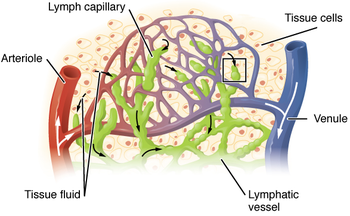

What is the lymphatic system?
- The lymphatic system is a circulatory system that contains approximately 6 to 10 litres of fluid.
- The lymphatic system and cardiovascular system are linked together and lymph nodes are stationed around body tissues and organs.
- There are 400 to 700 lymph nodes in the body, half of which are located in the abdomen.
- There is also a high concentration of lymph nodes (170 to 200) in the neck.
What is the primary function of the lymphatic system?
- The lymphatic system includes vessels filled with lymphatic fluid.
- Lymph nodes absorb the fluid where it is filtered and purified.
- The lymph fluid transported by these vessels contain products such as toxins, bacteria, dead cells, excess proteins hormones and immunocompetent cells.
- Lymphatic drainage breaks down these waste products; toxins, bacteria, chemicals and excess proteins so they can be easily handled by the organs of elimination including the liver and kidneys.
What causes the lymphatic system to breakdown?
The lymphatic system may break down at times or stop due to factors such as:
- venous insufficiency
- stress
- chemical overload
- (sport) injuries
- age
- lack of activity
- increased consumption of food additives.
These factors cause the circulation of fluids and, therefore, the cleansing process to slow down, which in turn compromises the health of the soft issue environment and opens the way to physical ailments.
"If the lymphatic system did not act to evacuate the excess protein from around the cells, the body would suffer massive oedema, function complications and die within 24 to 48 hours" (Guyton, A.C, 1971)
